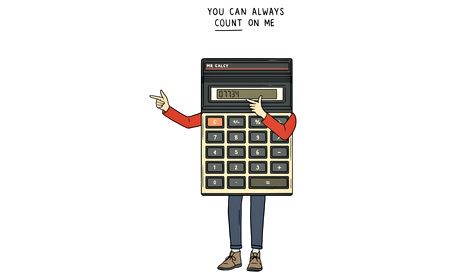
When am I going to use this? How often have I heard a sophomore student say that in a math class? And I can just hear you now saying, "Hey Jordan, I know I'm a sucker for all these sorta books that claim they're gonna help me understand like really difficult science and math problems that went way, way over my head at high school because they're written in a chatty style, but from experience I can tell you that within 20 pages I am like completely lost and really not any the wiser because the thing about really, really difficult math is that it is really, really difficult."
Whoa! Stop right there. I get where you're coming from, dude. I feel your pain. But bear with me. This time it will be different, I promise. Think of it this way. Imagine you just paid the full-price of £20 for this book. Now, £20 is £20 right? Wrong, dude. Very wrong. You've just fallen for Bernouilli's St Petersburg paradox, which can be simply explained using the formula (½) x 1 + (¼) x 2 + (1/8) x 3 + (1/16) x 4 + ... You get my drift? Point being that once you've realised that £20 isn't the same to a banker as it is to someone on benefits then you've got this little sucker tamed.
So how we gonna work out what this £20 is worth to you? Now we could just say that c + bx + ax2 = 0 and leave it at that, or we could measure it on a 24-dimensional Leech lattice. But let's instead define it in terms of utils, or units of expected value. If £1 is one util, then you would normally expect to get at least 20 utils from a £20 book. More, probably, from a book like this, as you will be hoping it will give you an edge in future exchanges. Now let's see what you do actually get. You get the expectation of being thought quite clever, less the fact that you only read 20 pages and less the fact you are not really any the wiser. This can be expressed, using Buffon's Needle, as J / 175,000,000 + 1,000,000 / 5,000,000 + 10,000 / 650,000 + 100 / 19,000 + 100 /12,000 + 7 / 700 + 7 / 360 + 4 / 110 + 4 / 55. which is to say that the real cost of the book is £863.75. Still a bargain, mind.
How so? I can hear y'all askin'. Simple. It's all down to the null hypothesis, which is the source of so many fallacies in the real world. The key to understanding something is not just to measure what is there, but to also to measure what isn't there. You see what I'm getting at, here? The way to value this book is not to think in terms of what you don't understand within its covers, but to define it by what you do know that isn't included. And that's quite a bit, I'd guess. Less for some of you, perhaps. But still, enough. So when you include all these hidden utils, then the book works out at just £1.0000634p. At that price, I'm almost giving it away.
Now let's move on to some other more straightforward problems. Like is there a God? If you're using the standard p>0.5, then yes, but don't just take it from me. Look at the probabilities. Now as we've already seen in Boylais's postulate, every straight line is a curve and every curve is a straight line and if we add everything up then 75% x 1000 + 24% x (-200) = 750 – 50 = 700. So there is more likely to be a God than not, especially if you employ Pascal's wager. Take the sequence RRRRRR and RLLLRL. One appears more uniform, the other more random. Except they both have the same probability of coming up. Spooky? Then get this. Neither was a random sequence because I wrote them down.
Where are we going with all this, you might ask? Well let me tell you. First off, if you've never missed a plane then you've wasted too much of your life in an airport. Don't bother to quit cigarettes if you're a smoker as you've already got lung cancer. Statistically, it is more probable that lung cancer causes smoking rather than vice versa. And I've got some great news for politicians. It's always best to do absolutely nothing. Think about it. If a third of the country wants you to do one thing, another third wants you to do the opposite and the final third wants you to leave things as they are, then you're always going to piss off the majority of people whatever you do. So do nothing and give yourself an easy life. Being right is a tall order: so always settle for not being so wrong that anyone notices.
Digested read, digested: How not to be understood.

